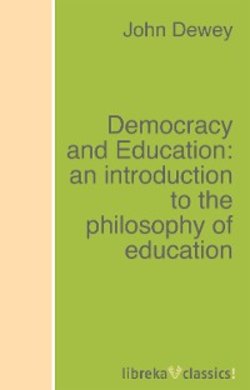Democracy and Education: an introduction to the philosophy of education

Реклама. ООО «ЛитРес», ИНН: 7719571260.
Отрывок из книги
I have tried to make this the most accurate text possible but I am sure that there are still mistakes.
I would like to dedicate this etext to my mother who was a elementary school teacher for more years than I can remember. Thanks.
.....
A clew may be found in the fact that the horse does not really share in the social use to which his action is put. Some one else uses the horse to secure a result which is advantageous by making it advantageous to the horse to perform the act—he gets food, etc. But the horse, presumably, does not get any new interest. He remains interested in food, not in the service he is rendering. He is not a partner in a shared activity. Were he to become a copartner, he would, in engaging in the conjoint activity, have the same interest in its accomplishment which others have. He would share their ideas and emotions.
Now in many cases—too many cases—the activity of the immature human being is simply played upon to secure habits which are useful. He is trained like an animal rather than educated like a human being. His instincts remain attached to their original objects of pain or pleasure. But to get happiness or to avoid the pain of failure he has to act in a way agreeable to others. In other cases, he really shares or participates in the common activity. In this case, his original impulse is modified. He not merely acts in a way agreeing with the actions of others, but, in so acting, the same ideas and emotions are aroused in him that animate the others. A tribe, let us say, is warlike. The successes for which it strives, the achievements upon which it sets store, are connected with fighting and victory. The presence of this medium incites bellicose exhibitions in a boy, first in games, then in fact when he is strong enough. As he fights he wins approval and advancement; as he refrains, he is disliked, ridiculed, shut out from favorable recognition. It is not surprising that his original belligerent tendencies and emotions are strengthened at the expense of others, and that his ideas turn to things connected with war. Only in this way can he become fully a recognized member of his group. Thus his mental habitudes are gradually assimilated to those of his group.
.....